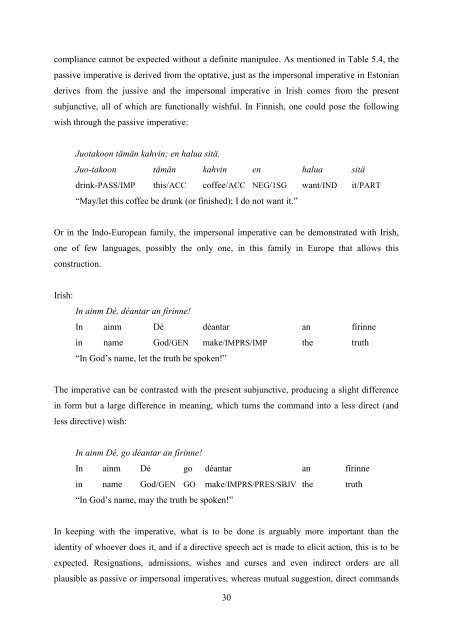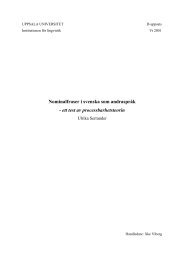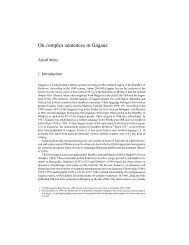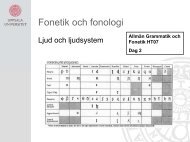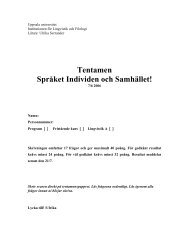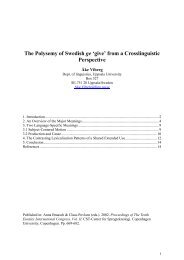The function of non-canonical imperatives in the languages of Europe
The function of non-canonical imperatives in the languages of Europe
The function of non-canonical imperatives in the languages of Europe
You also want an ePaper? Increase the reach of your titles
YUMPU automatically turns print PDFs into web optimized ePapers that Google loves.
compliance cannot be expected without a def<strong>in</strong>ite manipulee. As mentioned <strong>in</strong> Table 5.4, <strong>the</strong><br />
passive imperative is derived from <strong>the</strong> optative, just as <strong>the</strong> impersonal imperative <strong>in</strong> Estonian<br />
derives from <strong>the</strong> jussive and <strong>the</strong> impersonal imperative <strong>in</strong> Irish comes from <strong>the</strong> present<br />
subjunctive, all <strong>of</strong> which are <strong>function</strong>ally wishful. In F<strong>in</strong>nish, one could pose <strong>the</strong> follow<strong>in</strong>g<br />
wish through <strong>the</strong> passive imperative:<br />
Juotakoon tämän kahv<strong>in</strong>; en halua sitä.<br />
Juo-takoon tämän kahv<strong>in</strong> en halua sitä<br />
dr<strong>in</strong>k-PASS/IMP this/ACC c<strong>of</strong>fee/ACC NEG/1SG want/IND it/PART<br />
“May/let this c<strong>of</strong>fee be drunk (or f<strong>in</strong>ished); I do not want it.”<br />
Or <strong>in</strong> <strong>the</strong> Indo-<strong>Europe</strong>an family, <strong>the</strong> impersonal imperative can be demonstrated with Irish,<br />
one <strong>of</strong> few <strong>languages</strong>, possibly <strong>the</strong> only one, <strong>in</strong> this family <strong>in</strong> <strong>Europe</strong> that allows this<br />
construction.<br />
Irish:<br />
In a<strong>in</strong>m Dé, déantar an fír<strong>in</strong>ne!<br />
In a<strong>in</strong>m Dé déantar an fír<strong>in</strong>ne<br />
<strong>in</strong> name God/GEN make/IMPRS/IMP <strong>the</strong> truth<br />
“In God’s name, let <strong>the</strong> truth be spoken!”<br />
<strong>The</strong> imperative can be contrasted with <strong>the</strong> present subjunctive, produc<strong>in</strong>g a slight difference<br />
<strong>in</strong> form but a large difference <strong>in</strong> mean<strong>in</strong>g, which turns <strong>the</strong> command <strong>in</strong>to a less direct (and<br />
less directive) wish:<br />
In a<strong>in</strong>m Dé, go déantar an fír<strong>in</strong>ne!<br />
In a<strong>in</strong>m Dé go déantar an fír<strong>in</strong>ne<br />
<strong>in</strong> name God/GEN GO make/IMPRS/PRES/SBJV <strong>the</strong> truth<br />
“In God’s name, may <strong>the</strong> truth be spoken!”<br />
In keep<strong>in</strong>g with <strong>the</strong> imperative, what is to be done is arguably more important than <strong>the</strong><br />
identity <strong>of</strong> whoever does it, and if a directive speech act is made to elicit action, this is to be<br />
expected. Resignations, admissions, wishes and curses and even <strong>in</strong>direct orders are all<br />
plausible as passive or impersonal <strong>imperatives</strong>, whereas mutual suggestion, direct commands<br />
30


